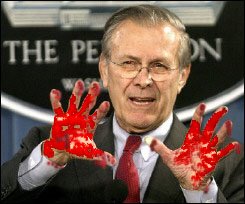Judge frees torturers
 Ernie Halfdram, The Bureau of Counterpropaganda
Ernie Halfdram, The Bureau of CounterpropagandaIn case there was any doubt about the relation between courts and justice, it would seem that it’s still that case that the issue is not what you did or whether you’re the one who did it, but who you are. No matter how gruesome and appalling the crime. The BBC reported the morning that A US court has dismissed a lawsuit against former US defence secretary Donald Rumsfeld over claims prisoners were tortured in Iraq and Afghanistan. even though The court accepted that the nine men who sued had been tortured - and detailed the torture in its ruling. In a ruling stretching to nearly 60 pages, the chief judge of the US district court for the District of Columbia said the allegations of torture were "horrifying".But Judge Thomas Hogan ruled the five Iraqis and four Afghans did not have US constitutional rights, and also that Mr Rumsfeld was immune from such suits. Judge Hogan threw out the claims against retired Lt Gen Ricardo Sanchez, the former commander of US military forces in Iraq, Col Thomas Pappas and former Brig Gen Janis Karpinski, both former commanders at Abu Ghraib prison...
continua / continued
From: The Progressive Date: 1/1/1993 Author: Knoll, Erwin
Almost a quarter century ago, in the March 1970 issue of The Progressive, a headline posed an arresting question: Must We Hang Nixon, Too? The author whose article appeared under that head, A. Frank Reel, had served as defense counsel for Japanese General Tomoyuki Yamashita, who was tried, convicted, and hanged in the first of the war-crimes prosecutions that followed World War II.
Almost a quarter century ago, in the March 1970 issue of The Progressive, a headline posed an arresting question: Must We Hang Nixon, Too? The author whose article appeared under that head, A. Frank Reel, had served as defense counsel for Japanese General Tomoyuki Yamashita, who was tried, convicted, and hanged in the first of the war-crimes prosecutions that followed World War II.
Telford Taylor, in his engrossing recollection of the Nuremberg war-crimes trials, alludes only briefly to the Yamashita case. Yamashita, he notes, was charged with "failing to prevent his troops from massacring numerous Filipino civilians. There was no specific allegation that Yamashita had ordered these atrocities, or even that he knew at the time that they were in process, or that he could have stopped them had he known. On such a record, the indictment of a German general, much less the conviction and execution imposed on Yamashita, would have been highly unlikely. Apparently, in old-line military circles yellow generals did not rank as high in the scale of virtue as Nordic white ones."
What prompted Reel's article early in 1970 was the then-recent disclosure of the massacre of civilians by a U.S. infantry unit at the Vietnamese village of My Lai. Under the Yamashita and Nuremberg precedents, Reel argued, President Nixon and other high U.S. military and civilian officials were subject to indictment and trial for crimes against humanity. >>>cont




0 Comments:
Post a Comment
<< Home